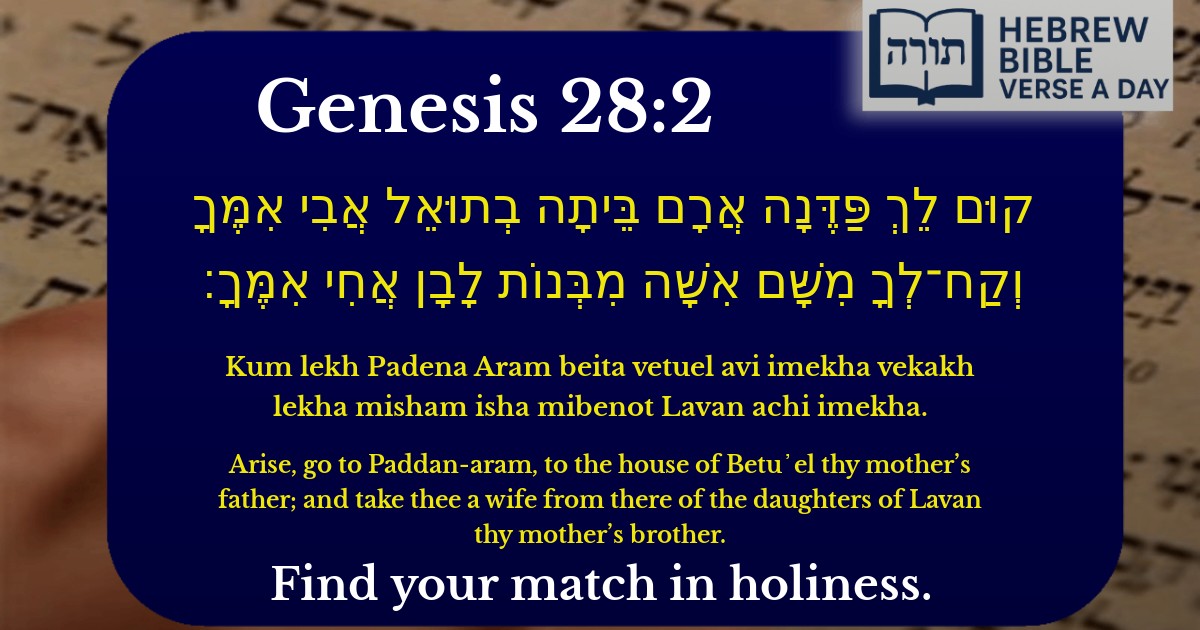Join Our Newsletter To Be Informed When New Videos Are Posted
Join the thousands of fellow Studends who rely on our videos to learn how to read the bible in Hebrew for free!
Hebrew Text
קוּם לֵךְ פַּדֶּנָה אֲרָם בֵּיתָה בְתוּאֵל אֲבִי אִמֶּךָ וְקַח־לְךָ מִשָּׁם אִשָּׁה מִבְּנוֹת לָבָן אֲחִי אִמֶּךָ׃
English Translation
Arise, go to Paddan-aram, to the house of Betu᾽el thy mother’s father; and take thee a wife from there of the daughters of Lavan thy mother’s brother.
Transliteration
Kum lekh Padena Aram beita vetuel avi imekha vekakh lekha misham isha mibenot Lavan achi imekha.
Hebrew Leining Text
ק֥וּם לֵךְ֙ פַּדֶּ֣נָֽה אֲרָ֔ם בֵּ֥יתָה בְתוּאֵ֖ל אֲבִ֣י אִמֶּ֑ךָ וְקַח־לְךָ֤ מִשָּׁם֙ אִשָּׁ֔ה מִבְּנ֥וֹת לָבָ֖ן אֲחִ֥י אִמֶּֽךָ׃
ק֥וּם לֵךְ֙ פַּדֶּ֣נָֽה אֲרָ֔ם בֵּ֥יתָה בְתוּאֵ֖ל אֲבִ֣י אִמֶּ֑ךָ וְקַח־לְךָ֤ מִשָּׁם֙ אִשָּׁ֔ה מִבְּנ֥וֹת לָבָ֖ן אֲחִ֥י אִמֶּֽךָ׃
🎵 Listen to leining
Parasha Commentary
📚 Talmud Citations
This verse is quoted in the Talmud.
📖 Megillah 17a
The verse is referenced in the context of discussing the lineage and marriages of the patriarchs, particularly focusing on the directive given to Jacob to go to Paddan-aram to find a wife.
📖 Sanhedrin 107b
The verse is mentioned in a discussion about the importance of marrying within one's family or community, as exemplified by Jacob's journey to find a wife from his mother's family.


Context of the Verse
This verse (Genesis 28:2) records Yitzchak's instruction to Yaakov to journey to Padan-Aram to find a wife from the family of his mother, Rivka. This directive follows Esav's marriage to Canaanite women, which caused distress to Yitzchak and Rivka (Genesis 26:34-35). The Torah emphasizes the importance of marrying within the family lineage, as Avraham had similarly instructed his servant regarding Yitzchak's marriage (Genesis 24:3-4).
Rashi's Commentary
Rashi explains that Yitzchak specifically instructed Yaakov to go to "בֵּיתָה בְתוּאֵל" ("the house of Betuel") rather than directly to Lavan because Betuel was still alive at the time, and it would have been disrespectful to bypass him. Additionally, Rashi notes that the phrasing "מִבְּנוֹת לָבָן" ("from the daughters of Lavan") implies that Yaakov was to marry one of Lavan's daughters, not his granddaughters, ensuring the purity of the lineage.
Ramban's Insights
The Ramban (Nachmanides) elaborates that Yitzchak's instruction was not merely practical but also prophetic. He points out that Yitzchak was aware of the divine promise to Avraham that his descendants would inherit the land, and thus, he sought to ensure that Yaakov's marriage would align with this destiny. The Ramban also highlights that the repetition of "אֲחִי אִמֶּךָ" ("your mother's brother") emphasizes the maternal lineage's importance in maintaining spiritual continuity.
Midrashic Interpretations
Halachic Implications
The Rambam (Mishneh Torah, Hilchot Issurei Bi'ah 12:25) derives from this verse the principle that marrying within one's extended family is permissible and sometimes even commendable, provided the union adheres to Torah law. However, he clarifies that this does not override the prohibitions against certain familial relationships outlined in the Torah.
Symbolism of Padan-Aram
Kabbalistic sources (e.g., the Zohar) interpret Padan-Aram as a place of spiritual refinement. Yaakov's journey there symbolizes the soul's descent into the physical world to elevate sparks of holiness. The "house of Betuel" represents the realm of potential, where Yaakov would find his righteous wives and establish the foundation of Klal Yisrael.